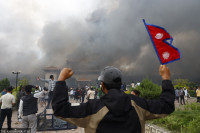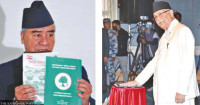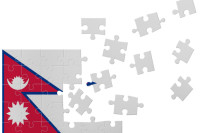Opinion
Abuse of authority
Following a public outcry and a kind of ‘note of dissent’ from the Commission for the Investigation of Abuse of Authority (CIAA), the drafters of the constitution have now restored the CIAA’s existing jurisdiction. Earlier, the drafters had decided to curtail its power to investigate acts of improper conduct. In the newly proposed draft, they have also sought to clarify the meaning of acts of improper conduct as “any act of ignoring or violating laws, decisions or orders thereby incurring losses to the nation or to the concerned agency”. The controversy surrounding the number and job security of the CIAA’s existing commissioners still remains.
Following a public outcry and a kind of ‘note of dissent’ from the Commission for the Investigation of Abuse of Authority (CIAA), the drafters of the constitution have now restored the CIAA’s existing jurisdiction. Earlier, the drafters had decided to curtail its power to investigate acts of improper conduct. In the newly proposed draft, they have also sought to clarify the meaning of acts of improper conduct as “any act of ignoring or violating laws, decisions or orders thereby incurring losses to the nation or to the concerned agency”. The controversy surrounding the number and job security of the CIAA’s existing commissioners still remains.
The country is definitely in dire need of a strong, independent, autonomous, impartial and accountable anti-graft agency. The drafters of the constitution are more driven by a desire to control the agency than to give it an independent and autonomous shape. In a country where members of any commission or government agency are shared under the political bhagbanda system, forming an autonomous and accountable agency remains a distant dream. As goes a popular Chinese proverb, can a crab teach its children how to walk straight?
Absurd arguments
Currently, the CIAA has the authority to investigate charges related to corruption and improper conduct by public officials, except in cases where a separate provision exists in the laws. With regard to the first category of crimes, the agency can investigate and prosecute accused public officials. The final adjudication of the crime rests with the court. With regard to improper conduct, the agency can only investigate and recommend departmental action to the concerned agency.
The drafters of the new constitution have proposed to curtail the CIAA’s power to investigate and recommend departmental action for improper conduct of public officials. This proposal has come at a time when the CIAA has been contemplating reviewing the anti-corruption laws in line with the United Nations Convention against Corruption (UNCAC) to broaden the definition of corruption charges to include corruption in private and non-governmental sectors. Furthermore, this has also come at a time when the CIAA has been expanding its operations through the establishment of regional and sub-regional offices, including staff strength. This proposal has also come at a time when a subtle rivalry has emerged between the CIAA and parliamentary oversight agencies.
Other than Ramesh Lekhak, a Nepali Congress lawmaker, no one has justified this proposal. Even Lekhak’s remarks that the “investigation of improper conduct is not in the realm of the CIAA” falls short of public expectations. Another absurd writing on this issue comes from a News Editor of Kantipur who has accused the CIAA of improper conduct and therefore, demanded that its power to investigate improper conduct be taken away. Going by this logic, the CIAA should also be stripped of its power to investigate corruption crimes. Who knows, maybe the body itself is infested by corruption.
Problem of ambiguity
Though the drafters have decided to restore the power of the CIAA in the newly proposed constitution with a clarification defining what constitutes improper conduct, the controversy surrounding its jurisdiction will continue as long as the writers of the constitution stick to an ambiguous definition of corruption and who should be responsible to fight it.
In Sri Lanka, the anti-corruption agency is called the Commission to Investigate Allegations of Bribery or Corruption. It is reported that its founders had to insert the words ‘bribery’ and ‘corruption’ in the name as they could not agree on the definition of ‘corruption’. The drafters of Nepal’s constitution do not seem to be clear on nuanced concepts like abuse of authority, corruption and improper conduct. Interestingly, there is no universally accepted definition of corruption. Even the UNCAC, the international instrument against corruption, does not have a specific definition. It only identifies various categories or acts of corruption. This seems to have been deliberately done so that the ambit of corruption charges can be expanded to the broadest possible.
Living with corruption
Forget about laymen, even Transparency International-Nepal Chapter, which is supposed to act like an anti-corruption think tank, seems to be utterly lacking in knowledge and understanding. In its 20-point suggestions submitted to the Constituent Assembly, one of the points says that the “effective control of corruption is the sole responsibility of the executive”. In another point, it mentions how it wants to see the establishment of a strong, independent and autonomous CIAA with expanded jurisdiction. This is an absurd argument. If the anti-corruption responsibility rests squarely with the government, there is no need to establish a constitutional anti-graft agency like the CIAA. We have formed the agency simply because the government will not be interested in fighting corruption.
It is true that much of the corruption takes place within the government itself, therefore, it is the government who knows where the shoe pinches. However, no government in the world can be expected to be interested in washing its dirty linen in public. Even if it is interested, it will only seek to control petty corruption. No government dares to challenge corruption of a grander scale as it could even lead to the collapse of the government itself. So, while Prime Minister Sushil Koirala may be adept at complaining that the CIAA has not caught any big fish and is only troubling minions in the bureaucracy, a single concerted move by the CIAA will be more than enough to destabilise the country’s political equilibrium.
Take the case of the cantonment corruption by the Maoists. During his tenure, Baburam Bhattarai clearly warned against derailing the peace process by demanding investigations into the cantonment corruption, which is estimated to run into billions of rupees. Who knows, even the UN may be dragged into the controversy. The implications of corruption crimes extend far beyond what can be seen through the naked eye.
We basically define corruption only when the act is committed, not on its own, but through the act of the corrupt person. The act of corruption by the person eventually leads us to a situation where it becomes the norm and is no longer called so when everybody does it. The best and latest example of how we live in a corrupt system has been provided by no other than the President himself. He might absolve himself by referring to the Cabinet’s proposal or stressing his ceremonial role, but by approving the pardon granted to Pradeep Jung Pandey, the former president of the Federation of Nepalese Chambers of Commerce and Industry, who was convicted of corruption, he has violated the basic sanctity of Nepal’s anti-corruption law.
As per the anti-corruption law, no person convicted of corruption can be pardoned, revoked or mediated. The punishment is mandatory, the proceedings of the case can continue even after the cessation of the position or the demise of the accused (for example, the late Rabindra Nath Sharma), and the accused shall be automatically suspended from holding public position. If an executive can override the decision of the court, where is the rule of law in Nepal? Do we have a President standing above the law? Are we back in the old days of rajas and maharajas?
Manandhar is a freelance consultant with an interest in corruption and governance issues.




 7.12°C Kathmandu
7.12°C Kathmandu









